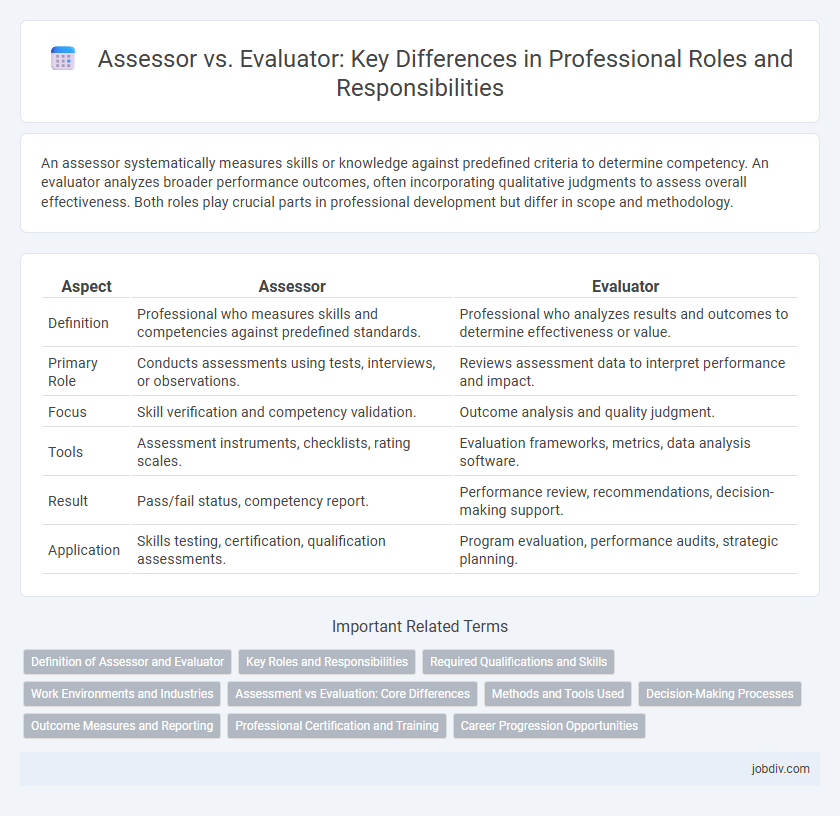An assessor systematically measures skills or knowledge against predefined criteria to determine competency. An evaluator analyzes broader performance outcomes, often incorporating qualitative judgments to assess overall effectiveness. Both roles play crucial parts in professional development but differ in scope and methodology.
Table of Comparison
| Aspect | Assessor | Evaluator |
|---|---|---|
| Definition | Professional who measures skills and competencies against predefined standards. | Professional who analyzes results and outcomes to determine effectiveness or value. |
| Primary Role | Conducts assessments using tests, interviews, or observations. | Reviews assessment data to interpret performance and impact. |
| Focus | Skill verification and competency validation. | Outcome analysis and quality judgment. |
| Tools | Assessment instruments, checklists, rating scales. | Evaluation frameworks, metrics, data analysis software. |
| Result | Pass/fail status, competency report. | Performance review, recommendations, decision-making support. |
| Application | Skills testing, certification, qualification assessments. | Program evaluation, performance audits, strategic planning. |
Definition of Assessor and Evaluator
An assessor systematically measures and verifies specific competencies or performance against established standards in a professional setting. An evaluator critically analyzes data or outcomes to judge quality, effectiveness, or value based on predefined criteria. Both roles aim to support decision-making processes but differ in their focus on measurement versus judgment.
Key Roles and Responsibilities
Assessors systematically measure performance against predefined criteria to determine competency or compliance, often within formal certification or regulatory frameworks. Evaluators analyze broader outcomes and effectiveness, interpreting data to provide insights for improvement in programs or projects. While assessors focus on judgment based on fixed standards, evaluators prioritize holistic appraisal and strategic recommendations.
Required Qualifications and Skills
Assessors require comprehensive expertise in industry-specific standards and often hold certifications such as ISO lead auditor or equivalent credentials to validate their proficiency in systematic evaluation. Evaluators typically possess strong analytical skills and a background in research or data analysis, with qualifications including degrees in social sciences or specialized training in assessment methodologies. Both roles demand excellent communication abilities and a thorough understanding of compliance requirements relevant to their respective fields.
Work Environments and Industries
Assessors primarily operate in regulated industries such as finance, healthcare, and construction, where compliance with standards and certifications is critical. Evaluators are commonly found in academic, research, and corporate environments, focusing on assessing performance, outcomes, and program effectiveness. Work environments for assessors emphasize audits and inspections, whereas evaluators engage in data analysis and reporting to inform decision-making.
Assessment vs Evaluation: Core Differences
Assessment measures specific knowledge, skills, or performance against predefined criteria, providing actionable insights for improvement. Evaluation involves a broader analysis of program effectiveness, outcomes, or value, often incorporating both qualitative and quantitative data. The assessor focuses on individual or task-based metrics, whereas the evaluator addresses overall impact and strategic goals.
Methods and Tools Used
Assessors typically utilize standardized checklists, observation protocols, and performance metrics to ensure objective measurement aligned with predefined criteria. Evaluators employ a broader range of methods, including qualitative interviews, surveys, data analysis software, and case studies to interpret outcomes and context. Both roles leverage digital tools like data management systems, but assessors focus on compliance verification while evaluators emphasize interpretive analysis and improvement recommendations.
Decision-Making Processes
Assessors systematically gather and analyze data to measure performance against established criteria, providing objective insights essential for informed decision-making processes in professional settings. Evaluators interpret these assessments by synthesizing qualitative and quantitative information to determine value, effectiveness, and impact, guiding strategic decisions and policy formulation. This distinction ensures clarity in roles within decision-making frameworks, enhancing accuracy and accountability in organizational outcomes.
Outcome Measures and Reporting
Assessors primarily focus on collecting and analyzing outcome measures to determine the effectiveness of a program or intervention, ensuring data accuracy and relevance. Evaluators synthesize these outcome measures into comprehensive reports that highlight findings, trends, and recommendations for decision-making. Both roles are critical for evidence-based reporting and continuous improvement in professional settings.
Professional Certification and Training
Assessors specialize in verifying competencies against predefined professional certification standards through structured evaluations, ensuring candidates meet specific training criteria. Evaluators analyze broader performance metrics and effectiveness within training programs to guide improvements and validate outcomes. Both roles are critical in maintaining the integrity and quality of professional certification processes.
Career Progression Opportunities
Assessors typically specialize in measuring specific competencies or performance metrics within a regulated framework, which often leads to career progression in quality assurance, compliance, and certification roles. Evaluators possess broader analytical skills, focusing on program effectiveness and impact, facilitating advancement into strategic management, policy development, or organizational improvement positions. Both roles offer pathways to senior positions, but assessors usually advance within technical and regulatory domains, while evaluators pursue leadership roles in planning and decision-making functions.
Assessor vs Evaluator Infographic

 jobdiv.com
jobdiv.com